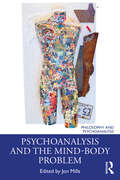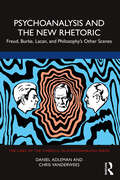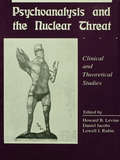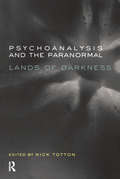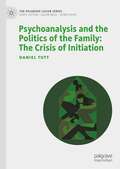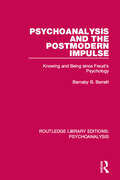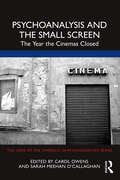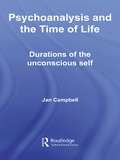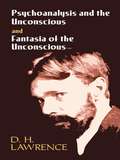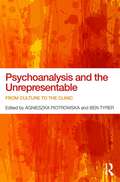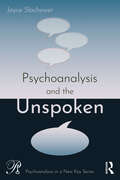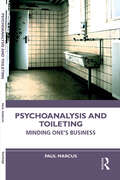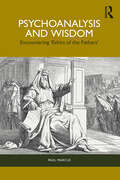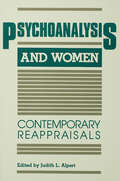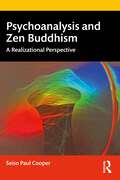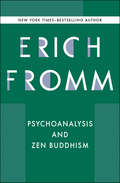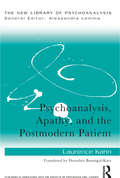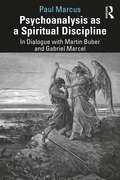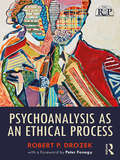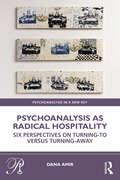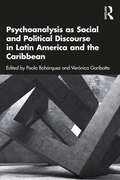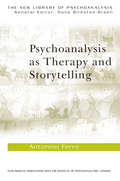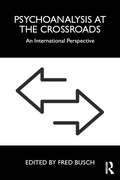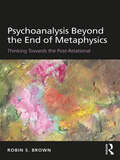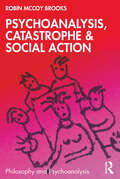- Table View
- List View
Psychoanalysis and the Mind-Body Problem (Philosophy and Psychoanalysis)
by Jon MillsIn this volume, internationally acclaimed psychoanalysts, philosophers, and scholars of humanities examine the mind-body problem and provide differing analyses on the nature of mind, unconscious structure, mental properties, qualia, and the contours of consciousness. Given that disciplines from the humanities and the social sciences to neuroscience cannot agree upon the nature of consciousness—from what constitutes psychic reality to mental properties, psychoanalysis has a unique perspective that is largely ignored by mainstream paradigms. This book provides a comprehensive exploration of the mind-body problem in various psychoanalytic schools of thought, including philosophical and metapsychological points of view. Psychoanalysis and the Mind-Body Problem will be of interest to psychoanalysts, philosophers, neuroscientists, evolutionary biologists, academics, and those generally interested in the humanities, cognitive science, and the philosophy of mind.
Psychoanalysis and the New Rhetoric: Freud, Burke, Lacan, and Philosophy's Other Scenes (The\lines Of The Symbolic In Psychoanalysis Ser.)
by Daniel Adleman Chris VanderweesPsychoanalysis and the New Rhetoric: Freud, Burke, Lacan, and Philosophy's Other Scenes is an innovative work that places the fields of psychoanalysis and rhetoric in dynamic resonance with one another. The book operates according to a compelling interdisciplinary conceit: Adleman provocatively explores the psychoanalytic aspects of rhetoric and Vanderwees probes the rhetorical dimensions of psychoanalytic practice. This thoroughly researched text takes a closer look at the "missed encounter" between rhetoric and psychoanalysis. The first section of the book explores the massive, but underappreciated, influence of Freudian psychoanalysis on Kenneth Burke’s "new rhetoric." The book’s second section undertakes sustained investigations into the rhetorical dimensions of psychoanalytic concepts such as transference, free association, and listening. Psychoanalysis and the New Rhetoric then culminates in a more comprehensive discussion of Lacanian psychoanalysis in the context of Kenneth Burke’s new rhetoric. The book therefore serves as an invaluable aperture to the fields of psychoanalysis and rhetoric, including their much overlooked disciplinary entanglement. Psychoanalysis and the New Rhetoric will be of great interest to scholars of psychoanalytic studies, rhetoric, language studies, semiotics, media studies, and communication studies.
Psychoanalysis and the Nuclear Threat: Clinial and Theoretical Studies
by Daniel Jacobs Howard B. Levine Lowell J. RubinThe analytic literature has heretofore been silent about the issues inherent in the nuclear threat. As a groundbreaking exploration of new psychological terrain, Psychoanalysis and the Nuclear Threat will function as a source book for what, it is hoped, will be the continuing effort of analysts and other mental health professionals to explore and engage in-depth nuclear issues. This volume provides panoramic coverage of the dynamic and clinical considerations that follow from life in the nuclear age. Of special interest are chapters deling with the developmental consequences of the nuclear threat in childhood, adolescence, and adulthood, and those exploring the technical issues raised by the occurrence in analytic and psychotherapeutic hours of material related to the nuclear threat. Additional chapters bring a psychoanalytic perspective to bear on such issues as the need to have enemies; silence as the "real crime"; love, work, and survival in the nuclear age; the relationship of the nuclear threat to issues of "mourning and melancholia"; apocalyptic fantasies; the paranoid process; considerations of the possible impact of gender on the nuclear threat; and the application of psychoanalytic thinking to nuclear arms strategy. Finally, the volume includes the first case report in the English language - albeit a brief psychotherapy - involving the treatment of a Hiroshima survivor. A noteworthy event in psychoanalytic publishing, Psychoanalysis and the Nuclear Threat betokens analytic engagement with the most pressing political and moral issue of our time, a cultivating of Freud's "soft voice of the intellect" in an area where it is desperately needed.
Psychoanalysis and the Paranormal: Lands of Darkness
by Nick TottonThis book demonstrates, in different ways, that paranormal phenomena are of direct relevance to psychoanalysis, and that they frequently impinge directly on its clinical practice—most obviously in the forms of telepathy and synchronicity.
Psychoanalysis and the Politics of the Family: The Crisis of Initiation (The Palgrave Lacan Series)
by Daniel TuttPsychoanalysis and the Politics of Family aims to raise a sophisticated and highly accessible debate around the family, self-making and the political and cultural implications of liberation. The text proposes a new way to read the Lacanian theory of Oedipus and through this reading resituate a series of important political and theoretical debates that have concerned intellectual life over the last forty years. It is written with an accessible style so that both specialists in Lacanian and Marxist theory and a broader cross-section of readers interested in understanding the implications of debates across populist and Marxist perspectives that have occupied the global left since the 2008 economic crash. The text aims to resituate the way theories of emancipation and liberation are theorized from a distinctive psychoanalytic and Lacanian point of view. In resituating the infamous “Oedipus complex” in a new light, the text re-opens a series of debates with important theoretical interlocutors, including the influential American historian and psychoanalytic thinker Christopher Lasch, whose thought has witnessed a significant renaissance of interest today, to the staunch critic of Freud and Lacan, René Girard, to Gilles Deleuze and Félix Guattari and their widely read Anti-Oedipus series that disputes the Freudian and Lacanian notions of Oedipus.
Psychoanalysis and the Postmodern Impulse: Knowing and Being since Freud's Psychology (Routledge Library Editions: Psychoanalysis)
by Barnaby B. BarrattAccording to the author, psychoanalytic theory and practice – which discloses ‘the interminable falsity of the human subject’s belief in the mastery of its own mental life’ – is in part responsible for the coming of the postmodern era. In this title, originally published in 1993, Barratt examines the role of psychoanalysis in what he sees as the crisis of modernism, shows why the modernist position – what he calls the ‘modern episteme’ – is failing, and proposes that psychoanalysis should redefine itself as a postmodern method. In Barratt’s innovative account of psychoanalysis, which focuses on the significance of the free-associative process, Freud’s discovery of the repressed unconscious leads to a claim that is basic to postmodern ideas: ‘that all thinking and speaking, the production and reproduction of psychic reality, is inherently dynamic, polysemous, and contradictorious .’ He argues that subsequent attempts to ‘normalize and systematize’ psychoanalysis are reactionary and antipsychoanalytic efforts to salvage the modern episteme that psychoanalysis itself calls into question.
Psychoanalysis and the Small Screen: The Year the Cinemas Closed
by Carol Owens Sarah Meehan O’CallaghanPsychoanalysis and the Small Screen examines the impact of cinema closures and the shift to small-screen consumption on our aesthetic and subjective desires during the COVID-19 pandemic from a Lacanian perspective. The chapters in this text hold a unique focus on the intersections of film, psychoanalysis, and the subjective implications of the shift from cinema to the small screen of domestic space. The subjects span historical and current Lacanian thinking, including the representation of psychoanalysis as artifice, Lacan appearing on television, the travails and tribulations of computer mediated analysis, the traumatrope, and the techno-inflected imagined social bond of what Jacques Lacan called the ‘alethosphere’. In this collection, the socio-cultural narratives and Real disruptions of the pandemic are framed as a function of the paradoxes of enjoyment characteristic of Lacanian psychoanalysis rather than merely the psychosocial repercussions of a planetary and contingent disaster. With contributions from practicing psychoanalysts, as well as academics working in related interdisciplinary areas, Psychoanalysis and the Small Screen will have appeal to readers of contemporary Lacanian work in general, to readers and researchers of contemporary psychoanalytic studies, and transdisciplinary and intersectional scholars engaged in psychoanalytic, cultural, and psycho-social research.
Psychoanalysis and the Time of Life: Durations of the Unconscious Self
by Jan CampbellIs psychoanalysis a narrative of self-knowledge, or a movement of lived time and the body? Psychoanalysis and the Time of Life examines the relationship between therapy and the time of life, presenting an original and thought-provoking re-reading of psychoanalysis in relation to questions of lived time. Jan Campbell investigates the early work of Freud, Janet, Breuer and Ferenczi, linking their ideas to the philosophy of Bergson. The link between psychoanalysis and the question of time connects these early debates with current issues that are central to our global society. Questions considered include: • is the unconscious based on representation or affect?• is the Oedipal Complex hysterical?• how is therapy related to the time of our life?• what is the role of hypnosis, in relation to psychoanalytic theory and transference?• Freud conceptualised the unconscious as timeless space, but what would it mean to think of the unconscious as the very essence of psychic bodily time? This book draws on the fields of traditional psychoanalysis, philosophy, neuroscience, and trauma studies providing a valuable new perspective on familiar concepts such as identity and consciousness. It will be of interest to students across the humanities and social sciences, and practicing psychoanalysts and psychoanalytic psychotherapists.
Psychoanalysis and the Unconscious and Fantasia of the Unconscious
by D. H. LawrenceThis volume features two profound essays by one of the English language's most famous and controversial authors. D. H. Lawrence wrote Psychoanalysis and the Unconscious and Fantasia of the Unconscious in the early 1920s, during his most productive period. Initially intended as a response to psychoanalytic criticism of his novel Sons and Lovers, these works progressed into a counterproposal to the Freudian psychoanalytic theory of the unconscious and the incest motive. They also voice Lawrence's concepts of education, marriage, and social and political action."This pseudo-philosophy of mine," explained Lawrence, "was deduced from the novels and poems, not the reverse. The absolute need one has for some sort of satisfactory mental attitude towards oneself and things in general makes one try to abstract some definite conclusions from one's experiences as a writer and as a man." With these two essays, the author articulates his insights into the mental struggle to rationalize and reconcile the polarity that exists between emotional and intellectual identities. Critical to understanding Lawrence's other works, they offer a bold synthesis of literary theory and criticism of Freudian psychology.
Psychoanalysis and the Unrepresentable: From culture to the clinic
by Agnieszka Piotrowska Ben TyrerPsychoanalysis and the Unrepresentable opens a space for meaningful debate about translating psychoanalytic concepts from the work of clinicians to that of academics and back again. Focusing on the idea of the unrepresentable, this collection of essays by psychoanalysts, psychotherapists, counsellors, artists and film and literary scholars attempts to think through those things that are impossible to be thought through completely. Offering a unique insight into areas like trauma studies, where it is difficult – if not impossible – to express one’s feelings, the collection draws from psychoanalysis in its broadest sense and acts as a gesture against the fixed and the frozen. Psychoanalysis and the Unrepresentable is presented in six parts: Approaching Trauma, Sense and Gesture, Impossible Poetics, Without Words, Wounds and Suture and Auto/Fiction. The chapters therein address topics including touch and speech, adoption, the other and grief, and examine films including Gus Van Sant’s Milk and Michael Haneke’s Amour. As a whole, the book brings to the fore those things which are difficult to speak about, but which must be spoken about. The discussion in this book will be key reading for psychoanalysts, including those in training, psychotherapists and psychotherapeutically-engaged scholars, academics and students of culture studies, psychosocial studies, applied philosophy and film studies, filmmakers and artists.
Psychoanalysis and the Unspoken (Psychoanalysis in a New Key Book Series)
by Joyce SlochowerWhat do therapists not talk about? What do we ignore/miss/sidestep? What factors—personal, social, political—inform our areas of blindness? This book names and explores what psychoanalytic theory often skips over or simplifies—how, when, and why we fail to uphold the professional ideal. Turning a critical eye on her own theory, Slochower reflects on how it, she, and the field have evolved and what remains unspoken. In so doing, she pushes us to do the same. With its sharp focus on both theory and clinical work, this book is essential reading for psychoanalysts and psychotherapists.
Psychoanalysis and Toileting: Minding One’s Business
by Paul MarcusPsychoanalysis and Toileting is an accessible book that delineates and interprets the psychological meanings of defecating and urinating in everyday life. Paul Marcus’ work gives the clinician an in-depth view of an activity that every patient and practitioner engage in and shows how not dealing with toileting in its wide range of social and practical contexts leaves out a huge aspect of the patient’s everyday experience. Drawing from psychoanalytic theory and practice, the author discusses such subjects as constipation, diarrhea and irritable bowel syndrome, adult female incontinence, toilet cursing, public toilet graffiti and toilet humor. The book also considers the personal meaning of urinating and defecating as seen in men suffering from an enlarged prostate, in ‘excremental assault’ in the Nazi concentration camps, and in dreaming. Marcus considers not only what is typically negative about these experiences, but what can be seen as positive in terms of growth and development for the ordinary person. The book is illustrated throughout with clinical vignettes and observations taken from the author’s private practice. Psychoanalysis and Toileting will be a key text for psychoanalysts and psychoanalytic psychotherapists in practice and in training. It will also be relevant to other mental health practitioners.
Psychoanalysis and Wisdom: Encountering ‘Ethics of the Fathers’
by Paul MarcusPsychoanalysis and Wisdom applies psychoanalytic insights into one of the great examples of wisdom literature, the Ethics of the Fathers, an ethical tractate of the Talmud.Paul Marcus quotes key passages from the Ethics of the Fathers, providing a psychoanalytic commentary to enlarge and deepen our understanding of its contents, focusing primarily on what constitutes a flourishing life. Marcus then considers what psychoanalysis can provide in its engagement with this classic of the wisdom teachings, such as illuminating aspects of the Ethics that are overlooked or underappreciated, and how “pearls of wisdom” from the Ethics can be incorporated into psychoanalytic theory and practice. The book contains clinical material as well as the insights of philosophers like Martin Buber, Gabriel Marcel and Emmanuel Levinas.Psychoanalysis and Wisdom will appeal to readers interested in psychoanalysis and psychotherapy and to academics and students of psychoanalytic studies, religious studies, Judaic studies and philosophy.
Psychoanalysis and Women: Contemporary Reappraisals
by Judith L. AlpertWithin the psychoanalytic framework, there is a growing body of research and thinking about female development. In addition, there is ongoing research within other areas of psychology, such as developmental psychology and social psychology, which has important implications for an understanding of women's adult development. Often these research findings are not readily available to the analytic community, nor has much of the research been incorporated into a psychoanalytic framework. Psychoanalysis and Women broadens analytic thinking by integrating contemporary literature from psychoanalysis with that of other areas, both within and outside psychology, which has implications for the undertanding of women's development. This literature is conceptualized within a psychoanalytic framework. A basic premise underlying this book is that psychoanalysis needs continuing review and revision in terms of what women and men are about and a continuing focus on whether and how unfounded biases prevent analysts from understanding patients. The present volume considers how sexism and feminism are affecting psychoanalysis and exemplifies how the emerging field of psychoanalysis of women and the issues its existence raises should be conceptualized. It also exemplifies some of the positive contributions that a feminist outlook gives to the study of human behavior and should esxpand the range of hypotheses that we have about people.
Psychoanalysis and Zen Buddhism: A Realizational Perspective
by Seiso Paul CooperIn this book, Cooper brings together psychoanalysis and Zen Buddhism by offering a comprehensive and integrated model, described as "The Realizational Model", that is consistent with the core concepts of Soto Zen Buddhism and psychoanalytic practice. Focusing primarily on Soto Zen Buddhism as presented in the original writings of the Japanese scholar monk Eihei Dōgen (1200-1253), and supported and elaborated by relevant contemporary scholarship in relation to the writings of the British psychoanalyst, Wilfred Bion (1897-1979), this book addresses the issue of how can one understand, assimilate, and integrate conceptions of the human mind that originate in the 13th and 20th centuries, as they are visited and inflected by the unconscious preconceptions of a 21st-century perspective. Expressing authentic Buddhist tradition within the frame of psychoanalytic thinking, and supported by online guided audio meditations that accompany the text, this work offers a uniquely interdisciplinary perspective of invaluable clinical significance. Case material garnered from 35 years of psychoanalytic practice as well as examples from daily life support the abstract concepts discussed in the text, rendering it equally relevant for psychoanalysts and psychotherapists, as well as students of Zen wishing to explore its practical applications.
Psychoanalysis and Zen Buddhism (Condor Bks.)
by Erich FrommThe renowned psychoanalyst and New York Times–bestselling author of The Art of Loving unites philosophy from the East and West. In 1957, social philosopher and psychoanalyst Erich Fromm invited Daisetz T. Suzuki, the most famous Zen Buddhist master in the Western world, to a seminar at his new home in Cuernavaca, Mexico. Their discussion was one of the highlights of Fromm&’s life, and the paper Fromm presented (and later expanded into a book) was a watershed work. Fromm demonstrates his mastery of the philosophy and practice of Zen, perfectly articulating how Zen tenets fit into the ideas of psychoanalysis. In this text, he creates new perspectives on both systems of thought. This ebook features an illustrated biography of Erich Fromm including rare images and never-before-seen documents from the author&’s estate.
Psychoanalysis, Apathy, and the Postmodern Patient (New Library of Psychoanalysis)
by Laurence KahnThe postmodern turn underlies a new development in psychoanalysis, which has theoretical and practical implications. Psychoanalysis, Apathy, and the Postmodern Patient involves a detailed reading of the main psychoanalytic texts that mark out this extended development, along with a critical examination of the changes in the major Freudian concepts. At stake are the tenets of infantile sexuality, ‘psychic reality,’ unconscious determinism, the fulfilment of unconscious desire, and free association. In this book, Laurence Kahn sets out a critique of postmodern psychoanalysis, via a theoretical and clinical discussion that tackles the place of metapsychology and the question of the scientific status of psychoanalysis. Starting from Freud’s own work, she considers such key topics as the analyst’s objectivity, the relevance of self-disclosure, the complex influence of French postmodern theorists, and the role of empathy in psychoanalytic technique. In so doing, she offers a perspective on psychoanalytic thought and practice that exposes the insidious taming of the Freudian model in favour of a 'humanistic' and 'dialogic' approach that obliterates the radical otherness of the unconscious. Coming from a powerful voice in the contemporary French psychoanalytic tradition, Psychoanalysis, Apathy, and the Postmodern Patient is a bold celebration of psychoanalysis that will be of great interest to psychoanalysts and psychoanalytic psychotherapists, as well as philosophers and historians of thought.
Psychoanalysis as a Spiritual Discipline: In Dialogue with Martin Buber and Gabriel Marcel
by Paul MarcusThe great existential psychiatrist Ludwig Binswanger famously pointed out to Freud that therapeutic failure could "only be understood as the result of something which could be called a deficiency of spirit." Binswanger was surprised when Freud agreed, asserting, "Yes, spirit is everything." However, spirit and the spiritual realm have largely been dropped from mainstream psychoanalytic theory and practice. This book seeks to help revitalize a culturally aging psychoanalysis that is in conceptual and clinical disarray in the marketplace of ideas and is viewed as a "theory in crisis" no longer regarded as the primary therapy for those who are suffering. The author argues that psychoanalysis and psychoanalytic psychotherapy can be reinvigorated as a discipline if it is animated by the powerfully evocative spiritual, moral, and ethical insights of two dialogical personalist religious philosophers—Martin Buber, a Jew, and Gabriel Marcel, a Catholic—who both initiated a "Copernican revolution" in human thought. In chapters that focus on love, work, faith, suffering, and clinical practice, Paul Marcus shows how the spiritual optic of Buber and Marcel can help revive and refresh psychoanalysis, and bring it back into the light by communicating its inherent vitality, power, and relevance to the mental health community and to those who seek psychoanalytic treatment.
Psychoanalysis as an Ethical Process (Relational Perspectives Book Series)
by Robert P. DrozekWhat role does ethics play in the practice of psychoanalysis and psychotherapy? For most of its history, psychoanalysis has viewed ethics as a "side issue" in clinical work—occasionally relevant, but not central to therapeutic action. In Psychoanalysis as an Ethical Process, Robert Drozek highlights the foundational importance of ethical experience in the therapeutic relationship, as well as the role that ethical commitments have played in inspiring what has been called the "relational turn" in psychoanalysis. Using vivid clinical examples from the treatment of patients with severe personality disorders, Drozek sketches out an ethically grounded vision of analytic process, wherein analyst and patient are engaged in the co-construction of an intersubjective space that is progressively more consistent with their intrinsic worth as human beings. Psychoanalysis can thus be seen as a unique vehicle for therapeutic and ethical change, leading to a dramatic expansion of agency, altruism, and self-esteem for both participants. By bringing our analytic theories into closer contact with our ethical experiences as human beings, we can connect more fully with the fundamental humanity that unites us with our patients, and that serves as the basis for deep and lasting therapeutic change. This book will be of interest to psychotherapists and psychoanalysts, as well as scholars in ethical theory and philosophy.
Psychoanalysis as Radical Hospitality: Six Perspectives on Turning-to versus Turning-Away (Psychoanalysis in a New Key Book Series)
by Dana AmirThis book focuses on different forms of turning-to versus turning-away from speech across a range of experiences in clinical treatment and general life.The chapters of this volume deal with the entrapment involved in exile from mother tongue, the parasitic language that uses the other's language as a linguistic prosthesis, the language of blank mourning which separates the mourner from their mourning, the adhesive identification of the voice and the psychotic split between voice and meaning, the mental hypotonia associated with an internalized object that turns away, and the spectrum between revenge and forgiveness. Each chapter sheds light on a different angle of the psyche's ability to spot its own leverage point and use it to transcend the infinite varieties of helpless victimhood: from the position of the victim to the position of the witness, from being the object of the narrative to being its subject, and from the position of righteousness to the willingness to forgive and be forgiven.This book is a must read for psychoanalysts, psychotherapists and literary scholars, as well as philosophers of language and of the mind.
Psychoanalysis as Social and Political Discourse in Latin America and the Caribbean
by Paola Bohórquez Verónica GaribottoThis book offers a regional, intersectional, and transnational perspective of psychoanalysis in Latin America and the Caribbean that illuminates psychoanalysis's role as social and political discourse through a collection of original interventions in the fields of psychoanalysis, cultural studies, psychology, anthropology, health sciences, history, and philosophy. The authors contribute to discussions about the applicability of psychoanalytic concepts to reading Latin American and Caribbean sociopolitical phenomona as well as how these regionally specific dimensions challenge and transform traditional psychoanalytic notions. Firstly, the book offers a regional overview of psychoanalysis as a discourse that reflects on the imbrication between the psychic and the sociopolitical. Secondly, it showcases intersectional perspectives that illuminate psychoanalysis's potentials and limitations in addressing contemporary problematics around race, gender, sexuality, and class. Finally, the book attests to the area's role in advancing psychoanalysis as a transnational discipline. By providing both a balanced regional overview and an interdisciplinary perspective, the volume will be essential for all psychoanalysts and scholars wanting to undersrand the place of psychoanalysis in Latin American and Caribbean discourse.
Psychoanalysis as Therapy and Storytelling (The New Library of Psychoanalysis)
by Antonino FerroIs psychoanalysis a type of literature? Can telling 'stories' help us to get at the truth? Psychoanalysis as Therapy and Storytelling examines psychoanalysis from two perspectives - as a cure for psychic suffering, and as a series of stories told between patient and analyst. Antonino Ferro uses numerous clinical examples to investigate how narration and interpretation are interconnected in the analytic session. He draws on and develops Bion's theories to present a novel perspective on subjects such as: psychoanalysis as a particular form of literature sexuality as a narrative genre or dialect in the analyst's consulting room delusion and hallucination acting out, the countertransference and the transgenerational field play: characters, narrations and interpretations. Psychoanalytic clinicians and theoreticians alike will find the innovative approach to the analytic session described here of great interest. Winner of the 2007 Sigourney Award.
Psychoanalysis at the Crossroads: An International Perspective
by Fred BuschIn this clear and thoughtful book, an international group of distinguished authors explore the central issues and future directions facing psychoanalytic theory and practice. The book explores four main questions in the development of psychoanalysis: what psychoanalysis is as an endeavour now and what it may be in the future; the effect of social issues on psychoanalysis and of psychoanalysis on social issues, such as race and gender; the importance of psychoanalytic institutes on shaping future psychoanalytic theory and practice; and the likely major issues that will be shaping psychoanalysis in years to come. Including contributions from within every school of psychoanalytic thought, this book is essential reading for psychoanalysts, psychoanalytic psychotherapists and all who are curious about the future directions of the profession.
Psychoanalysis Beyond the End of Metaphysics: Thinking Towards the Post-Relational
by Robin S. BrownWinner of the Theoretical Category of the American Board & Academy of Psychoanalysis Book Prize for best books published in 2016 Psychoanalysis Beyond the End of Metaphysics offers a new paradigm approach which advocates reengaging the importance of metaphysics in psychoanalytic theorizing. The emergence of the relational trend has witnessed a revitalizing influx of new ideas, reflecting a fundamental commitment to the principle of dialogue. However, the transition towards a more pluralistic discourse remains a work in progress, and those schools of thought not directly associated with the relational shift continue to play only a marginal role. In this book, Robin S. Brown argues that for contemporary psychoanalysis to more adequately reflect a clinical ethos of pluralism, the field must examine the extent to which a theoretical commitment to the notion of relationship can grow restrictive. Suggesting that in the very effort to negotiate theoretical biases, psychoanalytic practice may occlude a more adequate recognition of its own evolving assumptions, Brown proposes that the profession’s advance requires a return to first principles. Arguing for the fundamental role played by faith in supporting the emergence of consciousness, this work situates itself at the crossroads of relational, Jungian, and transpersonal approaches to the psyche. Psychoanalysis Beyond the End of Metaphysics will be of significant interest to all psychodynamically oriented clinicians, alongside scholars of depth psychology and the philosophy of mind. It will also be helpful to advanced and postgraduate students of psychoanalysis seeking to orient themselves in the field at present.
Psychoanalysis, Catastrophe & Social Action (Philosophy and Psychoanalysis)
by Robin McCoy BrooksThis fascinating volume uses psychoanalytic theory to explore how political subjectivity comes about within the context of global catastrophe, via the emergence of collective individuations through trans-subjectivity. Serving as a jumping-off point to address the structural linkage between collective catastrophe, subject, group, and political transformation, trans-subjectivity is the central tenet of the book, conceptualized as a psyche-social dynamic that initiates social transformation and which may be enhanced in the clinical setting. Each chapter investigates a distinct manifestation of trans-subjectivity in relation to various real-world events as they manifest clinically in the analytic couple and within group processes. The author builds her conceptual arguments through a psyche/social reading of Kristeva’s theory of signifiance (sublimation), Lacan’s 1945 essay on collective logic, Heidegger’s secular reading of the apostle Paul’s Christian revolution, and Žižek, Badiou and Jung’s conception of the neighbor within a differentiated humanity. The book features clinical illustrations, an auto-ethnographic study of the emergence of an AIDS clinic, an accounting of trans-subjectivity in Black revolutionary events in the U.S., and an examination of some expressions of care that arose in response to the COVID-19 pandemic. Psychoanalysis, Catastrophe & Social Action is important reading for psychoanalysts, psycho-dynamic based therapists, psychologists, group therapists, philosophers and political activists.
